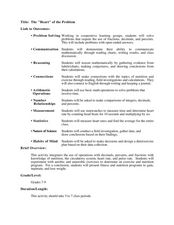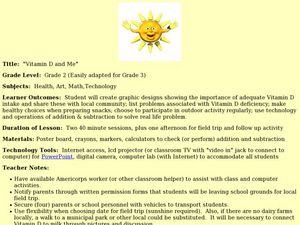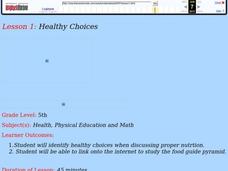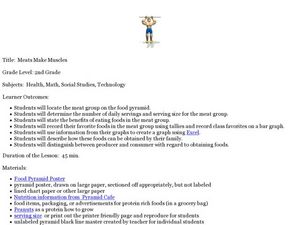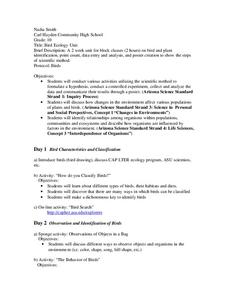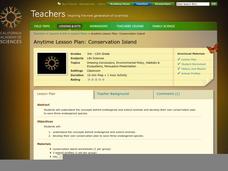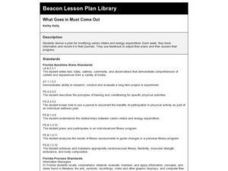Curated OER
Determining the Density of a Liquid
Young scholars find the density of diet soda and regular soda. In this density lesson plan, students measure the mass of a graduated cylinder with 10 different volumes of each soda. They find the mass of the liquid alone and use the...
Curated OER
Fiber - Adding It To The Diet - Skill Supplement
Students examine and prepare a recipe and state the purpose of each ingredient. They complete a worksheet based on the food pyramid.
Curated OER
The "Heart" of the Problem
Students explore mathematical operations while studying nutrition. In this physical fitness activity, students explore calories, pulse rate, and the circulatory system. Students use mathematical data to create a healthy physical fitness...
American Psychological Association
Do Cookies/Donuts Improve Memory? Errors in Methodology
If the methodology is skewed, the results will be skewed. That's the takeaway from an exercise designed to get class members thinking about research methods and statistics gathering. Instructors manipulate the testing environment to...
Curated OER
Vitamin D and Me
Students create a graphic organizer showing the importance of Vitamin D intake. In this Vitamin D lesson, Students list problems with Vitamin D deficiency and create poster boards in small groups. Individually, students will create menus...
Curated OER
Healthy Choices
Fifth graders discover how to make healthy choices in nutrition. In this nutrition lesson, 5th graders research the daily nutrition requirements recommended by the U.S. Department of Agriculture. Students keep a food diary for three days...
Curated OER
Food Comparison PDF
In this health worksheet, young scholars are led through lessons to become familiar with the dietary recommendations of the government.
Curated OER
See Turtles Nest! See Turtles Hatch!
Students graph data of sea turtles hatching rates from Watamu/Malindi Marine National Park and Reserve in Kenya. In this math lesson, students use real life science data to calculate mean and median values. Students use the data to...
Curated OER
Meats Make Muscles
Second graders explore the meat group of the food pyramid. In this nutrition and diet lesson, 2nd graders study the benefits of eating foods in the meat group, collect data regarding their classmates' favorite foods, and create a graph...
Curated OER
Bird Ecology Unit
Tenth graders conduct various activities utilizing the scientific method to formulate a hypothesis, conduct a controlled experiment, collect and analyze the data and communicate their results through a poster. They also identify...
Cornell University
Vitamin C Module
Test the levels of vitamin C in different juices. After a lesson on the importance of vitamin C in our diets, learners use titration to determine the vitamin C content in juice. They use their experience with the titration to study the...
Smithsonian Institution
Trait Tracker
Help mice beat the odds with an exciting activity about traits. Biologists discover the role of diet and other factors on animal traits by participating in a simulation activity. Teams collect and evaluate data to understand how certain...
Curated OER
Digestion & Nutrition: a Case Study
Middle schoolers explore digestion/nutrition and utilize scientific investigation skills. They complete meal logs for several days and graph their results. After analyzing their data, they write formal lab reports.
Curated OER
Ratios, Rates, Percent and Nutrition
Examine food labels to determine percentage of fat and sugar to total calories with middle schoolers. Daily nutritional guidelines are discussed and learners will decide how well their foods fit into a healthy diet. In the provided...
California Academy of Science
Conservation Island
Why not walk in the footsteps of Teddy Roosevelt and become a conservationist? After discussing issues and reasons for animal extinction, the class creates their own conservation plans. Each small group is given mock data regarding a...
California Academy of Science
Sustainable Food Solutions: Weighing the Pros and Cons
A growing demand for sustainable food systems comes from schools and even some cities. So what are some solutions? Scholars consider four different ways to approach sustainable food solutions and list the pros and cons of each. The fifth...
Curated OER
You Are What You Eat!
High schoolers evaluate information on various websites in relation to health concepts and healthy dieting in this technology-based High School Health lesson. Emphasis is placed on the use of small cooperative learning groups and the...
Curated OER
Total Daily Calories
Students explore the concept of calories. In this calories instructional activity, students calculate their Basal Metabolic Rate. Students determine the number of calories they burn each day. Students use a conversion factor of fat to...
Curated OER
How Can You See Which Soda Has More Sugar?
Sixth graders weigh regular and diet soda to see which one is heavier and therefore which one contains more sugar. In this soda lesson plan, 6th graders discover that regular soda contains more sugar because it weighs more.
Curated OER
Building Blocks and Healthy Snacks
Learners complete several activities to study healthy snacks. In this healthy diet lesson, students sing a song about healthy snacks. Learners then make a list of the healthy snacks in the song and vote for their favorite. Students...
Curated OER
Where do Plants Get their Food?
In this where do plants get their food worksheet, students design an experiment that will disprove the idea that plants obtain their food from soil. Students will set up their experiment and design a data table that will record data over...
Curated OER
Vitamin C and Protein Analysis
Students analyze various beverages to determine vitamin C content. Students research diseases resulting from vitamin C deficiencies and identify countries most affected.
Curated OER
Collect, organize and compare different data for the Marine Mammals of the Miami Seaquarium, i.e.: size, weight, diet and habitat and how to calculate average, median, mode and range.
Students collect, organize, and compare different data and develop statistical methods such as: average, median, mode and range as a way for decision making by constructing table
Curated OER
What Goes in Must Come Out
Learners monitor their calorie intake and energy expenditure. They keep track of daily data in a journal and assess and adjust their diets as appropriate.




